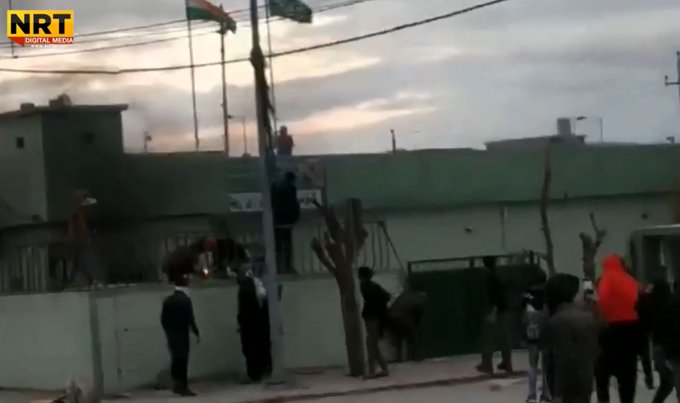And what happens when you cover protests? Often, they shut you down. NRT reports:
The security forces in Sulaimani entered NRT’s main headquarters at approximately 2 a.m. on Monday (December 7) and taking the channel’s broadcast off the air.
According to station staff, members of the security forces damaged some equipment and seized other items. The office has been closed and the security forces remain on the premises as of 3 a.m.
The security forces, which are affiliated with the Patriotic Union of Kurdistan (PUK), did not immediately present a court order backing up their actions.
NRT has been heavily covering the protests in Sulaimani governorate that began on Wednesday. Demonstrators have been voicing their anger at the Kurdistan Regional Government’s (KRG) handling of deteriorating economic conditions, lack of basic services, and the government’s failure to pay public sector salaries on time and in full.
The channel’s offices in Erbil and Duhok were closed without a court order for two months this autumn after it covered protests in both those governorates.
Today was the fifth consecutive day of protest in Suleimaniya. That's the KRG and, note, protesters are treated no better in the KRG than they are in the rest of Iraq. Ruba Ali al-Hassani Tweets:
Protests in Bazian, Suleimaniya, today cut off the highway between Suleimaniya and Kirkuk to stop oil transport. #Iraq #Kurdistan
In other news, at The Wilson Center, Hanaa Edwar notes:
This year, we have launched the mapping report on Sexual and GBV in Iraq 2003-2018, which was developed by Iraqi Al-Amal Association, Impunity Watch and PAX. The report is part of a broader project entitled “Engendering the Transition to Peace and Security in Iraq” funded by the Dutch Ministry of Foreign Affairs.
In addition, since the outbreak of protest demonstrations on October 2019, we have documented the killing of six female demonstrators and activists in different provinces. The latest was Dr. Reham Jacob in Basra in August 2020. Plus, many demonstrators encountered assassination attempts, death threats, abduction, or sexual assault. Many activists went into hiding to keep themselves and their loved ones safe.
Due to the influence of militias in the political and security apparatus and the spread of corruption in Iraq, women’s rights defenders, activists and journalists lack basic legal and social protections. We are seriously concerned about the impunity of death threats, abductions, sexual assault, intimidation, online harassment, and smear campaigns against them. We call on the international community to exert pressure on the Iraqi government to adhere to justice, accountability, and transparency through effective investigations of these crimes. Without protections for activists and civil society leaders, Iraq will never move forward on ending GBV.
